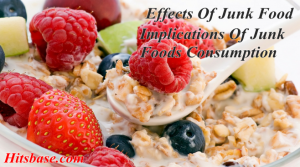Effects Of Junk Food | Implications Of Junk Foods Consumption

In the process of this, we are going to discuss the meaning, types; factors that influence the consumption of junk food and finally the implications of junk foods consumption. Junk food is that food that is quick and easy to prepare and eat but that is thought to be bad for your health.
Junk food is an informal term for food that is of little nutritional value and often high in fats, sugar, and calories. Foods more likely to be considered junk are those that are more convenient and easy to obtain. Examples of Common junk foods include fast foods like pizzas, chip, burgers, noodles among others; soft drink, snacks like Fanta, sprite, lemonade, margarine among others.
READ MORE: Child Nutrition Feeding | Importance Of Childhood Nutrition
Meanwhile, Junk food consumption is detrimental to health, it contains a high amount of calories, saturated fats, sodium salts and processed sweeteners that increase the risk of chronic diseases such as coronary artery diseases, asthma, stroke, and osteoporosis among others. Research reviewed that consumers consume junk foods regularly. We will be looking at some of the types of Junk foods.
TYPES OF JUNK FOODS
Junk foods are classified into the following:
- Fast foods: This includes burgers, pizzas, fibred, chips noodles and pasta and fish, among others, are foods that have been processed and refined in a way that they have lost most of their key nutrients and they are zero in fiber as well poor in water content.
- Soft drink: Soft drinks include coke, Fanta, Pepsi, sprite and other types of cold drinks with different names. They have a high content of sugar.
- Snacks: Snacks are another type of junk food which include chips pretzels, ice creams, sweets biscuits, chocolates, and crisps. They are also highly processed and contain a lot of additives, artificial colour, and preservatives.
Factors That Influences Consumption Of Junk Foods.
Food choice, in general, is a complex process that depends on culture and can be influenced by different factors such as personal, social, economic, emotional and government policy.
In addition, globalization is eroding tradition foods and offering more food choice and availability, all of which could be influenced by their eating patterns. These are some of the factors that can influence junk food consumption in the society:
1. Peer pressure: If you want to eat healthier food when dining out; research recommends surrounding yourself with friends who make healthier food choices. A study showed that when groups of people eat together at the restaurant; at which they must state their food choice aloud; they tend to select items from the same menu.
2. Taste: fast food has the blissful taste which is a taste; that is liked by many human beings. This blissful taste will attract people to buy fast food again and again.
3. Price: The majority of people are not concerned about the price of fast food; but they are concerned with satisfying their appetite satisfaction. So many people prefer junk food because it is lower in the prince but value for money.
4. Portion size: Many people prefer fast food because of the increasing; portion size of the food and cheap to afford. Many fast food establishments are upgrading their menu by increasing; the size of fast food to attract more customers to buy their products.
5. Culture: We hold this truth to be self-evident that Americans are seeing; their waistlines expanding more than ever, with no known end to our increasing girth. As a culture, we need to become more aware of forces outside of ourselves that are leading to our expanding waistlines. Personal discipline can only go so far in considering the health implication of junk foods.
6. Lack of time: mainly people go for junk food because they have many; activities to attend and have no time to prepare their food.
ALSO, READ MORE: Human Evolution On Earth | Stages Of Evolution of Man
Implications of Junk Foods Consumption.
- It can cause type two diabetes: One of the major contributing factors for the emerging; diabetes epidemic is an unhealthy diet full of junk and fast food. When you eat a healthy diet your body gets a steady supply of glucose; which helps maintain insulin sensitivity. On the other hand, when you eat only junk food, the excessive stress exerted; on your metabolism affect the ability of your body to use insulin properly.
- It can trigger digestive problems: Those who are addicted to fatty junk food are bound to suffer from digestive problems; like gastroesophageal reflux disease (GERD) and irritable bowel syndrome (IBS). That is because junk food is deep fried.
- It causes fatigue and weakness: Junk food lacks most of the essential nutrients like protein and vitamins; required for maintenance of overall health and functioning of all the system in the body.
- Causes depression among teenagers: A lot of hormonal changes occur in teenagers; which makes them susceptible to mood swing and behavioral changes. And a healthy diet plays an important role in maintaining that hormonal balance.
- It causes fluctuation in blood sugar levels: junk food is high in refined sugar which exerts stress on the metabolism. Refined sugar causes the pancreas to secrete more amount of insulin; in order to prevent a drastic spike in the blood sugar level.
- Increases the risk of heart disease: Junk food items are loaded with; saturated fats and these fats directly increase triglyceride and bad cholesterol level in the blood; contributing to plaque formation and heart disease.
- It can cause kidney disease: High amount of bad fats and sodium from salt; disrupts the sodium-potassium balance in the body and causes hypertension.
- Can cause damage to the liver: Surprisingly, junk food consumption over a period; of time can have a similar harmful effect on the liver as alcohol consumption does.
- It increases the risk of Cancer: Lack of fiber is the main reason why junk food; consumption is linked to an increased risk of cancers of the digestive system.
Conclusion
The government should enact a law that every junk food should be prepared with ingredients; that have nutritional values and should be prepared in a well-kept environment; as well as setup health workers to educate the general public on the need to eat junk food occasionally and not regularly and even when eaten should be eaten with vegetables and fruits.






